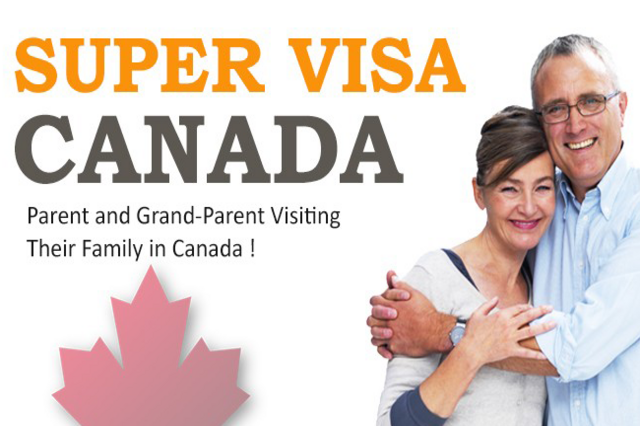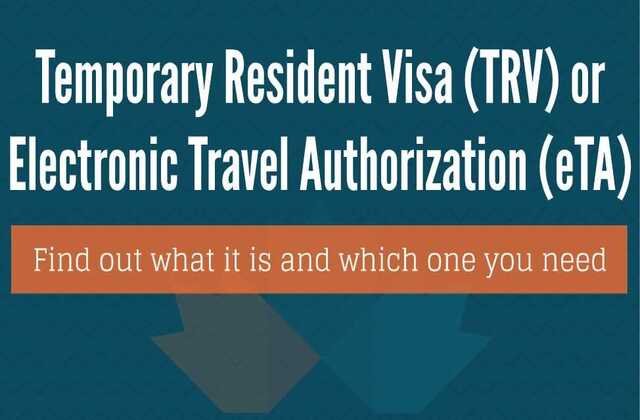Visit
All foreign nationals before entering Canada require a Visa to enter the country. There are various kinds of visas issued depending upon the purpose of visit and country one is arriving from.Every year more than 35 million temporary residents (non-immigrants) visit Canada. Except for Canadian citizens and permanent residents, all other individuals require permission to enter Canada as a visitor. The visitor can be classified into following categories.
- Tourists
- Temporary foreign workers (individuals with work permits)
- International students (individuals on study permits)
- Business Visitors and all of them require either a Temporary Resident Visa (TRV) or an eTA (electronic Travel Authorization), unless they are US Citizens.
TR or an eTACitizens of visa-exempt countries intending to travel to Canada by air are expected to have applied for and obtained an electronic Travel Authorization (eTA) before their departure to Canada.
Exception: Citizens of the United States do not require a TRV or an eTA, but Green Card holders in the United States, require an eTA to come to Canada, regardless of their nationality. All other visitors who are not from a visa-exempt country, need a TRV to enter Canada.
Types of Visa
Visitor Visa
There are two types of Canadian visitor visas: single entry visas and multiple entry visas. A single entry visa allows foreign nationals to enter Canada for one-time only. A multiple entry visa allows holders to enter and leave Canada as often as they want as long as the visa is valid. You don’t need to choose which kind to apply for, applicants are automatically considered for multiple entry visas and are only issued single entry visas under unique circumstances.
Multiple entry visitor visas permit the holder to travel to Canada for six months at a time as many times as they want, as long as the visa remains valid. They can be valid for up to 10 years, but the exact validity period is at the discretion of the visa officer issuing it. If you have some other status document, such as a study permit or a work permit, and are not otherwise visa-exempt, you will automatically be issued a visitor visa allowing you to enter Canada to receive your permit. Usually, this is a multiple entry visa. If you choose to temporarily leave Canada during the course of your studies or temporary work, you will not need to apply for a new visitor visa to re-enter Canada as long as your permit and visa are both still valid.
Who Needs a Visitor Visa
Everyone who wants to enter Canada who is not a Canadian citizen or permanent resident, or otherwise visa-exempt, requires a visitor visa. Canadian permanent residents are not permitted to apply for a visitor visa, even if their permanent resident card has expired. They must instead apply for a permanent resident travel document (PRTD). Canadian citizens, including dual citizens, are also not permitted to apply for a visitor visa. They must be travelling on a valid Canadian passport. If you are transiting through or coming to Canada for business, not as a temporary foreign worker, you may need a business visitor visa.
Visa-Exempt Countries
The only people, other than Canadian citizens and permanent residents, who do not require a visitor visa to enter Canada are individuals who are visa-exempt. Canada has agreements with several countries that exempt citizens of those nations from requiring a visa to visit Canada for a period of up to six months. If foreign nationals from visa-exempt countries wish to visit Canada by air, they require a valid electronic travel authorization (eTA).
If they choose to visit by land or by sea, they only require their valid passport issued by a visa-exempt country. The only exception is citizens of the United States. The Canada-U.S. border is the longest undefended land border in the world, and thousands of Canadian and U.S. citizens cross that border every day. U.S. citizens are able to travel to Canada on a valid U.S. passport, and do not require a visitor visa or eTA, provided they are not staying for a period longer than six months. U.S. permanent residents, or Green Card holders, are visa-exempt regardless of their country of citizenship. They require an eTA to fly to or transit through a Canadian airport, and must present a valid Green Card and a valid passport to enter Canada.
Student Visa
Student visa is intended to be given to foreign students who are coming to Canada for study. In order to be eligible for a Canada Student Visa ( study permit) students must first be accepted by a Canadian educational Institution for enrollment. In addition when they reach Canada, they require a temporary resident visa or electronic Travel Authorization depending upon from which country they are applying for study permit.
How the system works
Foreign students need to fulfill following conditions in order to be eligible for student visa :
- Students must have been accepted by a Designated Learning Institute (DLI) in Canada and must have received an acceptance letter from them before they submit their application for a Canada student visa.
- Students must prove that they have enough finance to pay for their tuition fees, living expenses for themselves as well as family members , if any, who come along and return transportation expenses for themselves and their family members who accompany them
- Students must not have any criminal record and must be a law-abiding citizen so that they are not a threat to Canada. For this they must be able to provide a police certificate.
- Students must be medically fit and must undergo prescribed medical test
- Students must be able to satisfy an immigration officer that they will leave Canada at the end of their authorized stay.
- Students who wish to study in a short-term course or program which lasts six months or less. In such cases they must complete their study within period authorized for stay in Canada.
Super Visa
Super Visa program is designed to allow family members to come to Canada as long-term visitors on a multiple entry visa that may last up to 10 years. A Super Visa is valid for 2 years before it has to be renewed.This is an ideal option for Canadian Citizens and Canadian Permanent Residents who are still to sponsor their parents for PR, or who currently do not qualify for Parental PR sponsorship.
The financial requirement for a Super Visa is considerably less strict than PR sponsorship- the minimum necessary income (MNI) is 30% lower than that of PR sponsorship, and only 1 year of gross income must exceed the MNI limit vs 3 years with PR Sponsorship
To be eligible for a Super Visa:
Following are requirements for sponsoring a super visa:-
- The sponsor must meet the minimum necessary income as defined from time to time (for Super Visa) requirement, which must be supported by most recent Canadian tax return (Notice of assessment) where line 150 meets or exceeds this amount.
- They must purchase Canadian healthcare insurance of $100,000 coverage for at least 1 year- (approximately $2,000 – $3,000 CAD per year per head).
- Medical examination of the sponsored person from authorized doctor is a must to be eligible under this category
a TRV visa.
Minimum Necessary Income to sponsor for Super Visa in 2021:
Family Members MNI 2021
| Size of Family Unit | Minimum necessary gross income |
|---|---|
| 1 person (your child or grandchild) | $25,921 |
| 2 persons | $32,270 |
| 3 persons | $39,672 |
| 4 persons | $48,167 |
| 5 persons | $54,630 |
| 6 persons | $61,613 |
| 7 persons | $68,598 |
| More than 7 persons, for each additional person, add | $6,985 |
Visit and work
As already explained in work category, the intending applicants must have a work permit of any category approved by the Canadian Government to be eligible under this Visa category.
Visit on business
The persons who wish to travel to canada for business also need TRV or eTA depending upon the country they are travelling from.If they wish to immigrate on the basis of investment, full details have been included in the business immigration section.
Temporary Resident Visas (Visitor Visas) and eTA (Electronic Travel Authorization) for Canada
Canada welcomes more than 35 million temporary residents (non-immigrants) each year. Except for Canadian citizens and permanent residents, all other individuals require permission to enter Canada as a visitor and require either a Temporary Resident Visa (TRV) or an eTA (electronic Travel Authorization), unless they are US Citizens.
The following foreigners need either a TRV or an eTA:
- Tourists
- Temporary foreign workers (individuals with work permits)
- International students (individuals on study permits)
- Business Visitors
TRV or an eTA? You only need one of them, not both
Citizens of visa-exempt countries intending to travel to Canada by air are expected to have applied for an obtained an electronic Travel Authorization (eTA) before their departure to Canada.
Exception: Citizens of the United States do not require a TRV or an eTA, but Green Card holders in the United States, require an eTA to come to Canada, regardless of their nationality.
If you are NOT a citizen from a visa-exempt country, you WILL need a TRV to enter Canada
What is a eTA (electronic Travel Authorization)?
As of March 15, 2016, travellers with passports from countries that are visa-exempt who enter Canada by air will need an eTA.
The authorization is electronically linked to your passport and is valid for five years or until your passport expires, whichever comes first.
What is a TRV and how to apply for one?
* If you require a TRV, please make sure you read the reasons for refusal.
The TRV is a document issued by a Canadian Immigration Visa Office outside Canada, showing that the holder has satisfied the requirements for admission to Canada as a visitor. TRVs may be for single entry or multiple entry. As a general rule, tourists are admitted for a period of six months. Temporary foreign workers and international students are admitted for varying periods of time, as determined on a case-by-case basis. Extensions may be applied for from within Canada.
It is important to note that possession of a valid TRV does not necessarily mean that the Officer at the Canadian Port of Entry will admit the visitor into Canada. At the Port of Entry, all visitors must demonstrate that the purpose of their visit to Canada is of a temporary nature. Officers at the Port of Entry will deny admission to all persons who, in their opinion, do not intend to leave Canada at the expiry of their visitor status.
Items to note:
- Certain applicants may need to undergo a medical examination. This pertains to some individuals who intend to remain in Canada and have recently visited certain countries, as well as persons who intend to work in certain occupations in Canada.
- Criminality and medical issues may prevent a visitor from entering Canada.
- Visitors to Canada must be able to prove their ability to support themselves during their intended temporary stay in Canada.
- Citizens of certain countries may need to provide biometric information.







